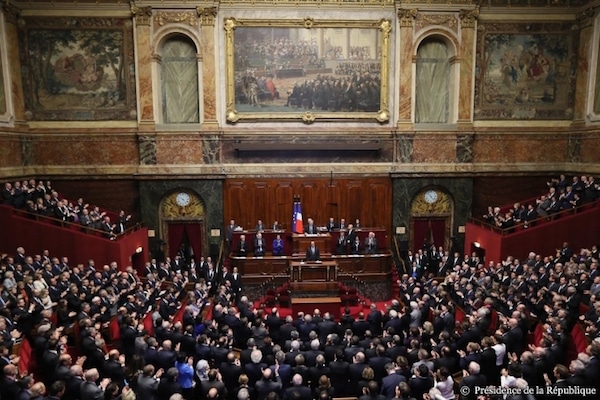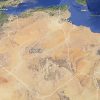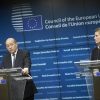
Yesterday the French President François Hollande, before the two parliamentary chambers sitting together as Congress in Versailles, said that ‘France is at war’ and that the coordinated terrorist attacks in Paris have been an ‘act of war’ of the Islamic State (ISIS or Daesh). And indeed, we are involved in a war, although unconventional. France and other countries are at war with Daesh in Iraq, Syria and parts of Africa, and the organisation, which is much more than just terrorist, is also at war against a broad range of enemies. The front line is global and in constant change. In recent weeks Daesh has caused a large number of civilian victims, reaching wartime levels, in indiscriminate attacks in Ankara (with 100 dead) and Beirut (40 dead), by blowing up a Russian airliner over the Sinai (224 dead) and now by striking Paris again (following the attacks in January and the foiled attempt on a high speed train). Unfortunately, further episodes must inevitably come.
The situation is serious, painful and for many incomprehensible. But it is not an existential war for France and the other countries under attack –certainly not for the US–, contrary to the Cold War, with its threat of nuclear annihilation, or Nazi aggression. It does not threaten the very existence of France –unlike that of ISIS, as a terrorist State– although it does affect our essence and our way of life, by generating fear and by making it necessary for us to defend ourselves. Furthermore, it affects our way of approaching the construction of Europe, with jihadist terrorism bringing borders back into existence, which in any case were re-emerging due to the refusal to admit refugees fleeing from the very same horror of Paris in their own daily lives in Syria or Yemen, even if some fanatics might slip through with them. Hollande has said it clearly: the attacks were planned in Syria, organised in Belgium and executed in France. And what is serious is that among the perpetrators in January there were young people educated in French republican values but willing to kill by dying in the name of their religious faith, which, it should be remembered, is a minority strand in Islam. But we are in a world where the few are in possession of a lot of power.
The Eurosceptics have seized on what has occurred in Paris to ask for the borders of their countries to be closed and to have the influx not only of refugees but of all immigrants halted. Konrad Szymanski, Minister of European Affairs in the new Europhobe Polish government, has said that his country, which had reluctantly accepted its quota of refugees (7,500), will now refuse them. Others, like the Slovakian government, are following suit. Even Nicolas Sarkozy has added fuel to the flames by asking for a change in French foreign and security policy instead of offering unity. And across the Atlantic, Donald Trump, the aspiring Republican candidate for the US presidency, has also wielded Paris to reject immigration (mainly from Latin America, in his case).
Daesh is an apocalyptic movement. Its aim is to conquer the Middle East and other parts of the world, but not Europe (although, as in the case of al-Qaeda, there are repeated calls to restore al-Andalus). The objective, as described in the statement issued by Daesh, is for the French –and the rest of us– to ‘continue smelling death for having been at the forefront of the crusade, for having dared to insult the prophet, for having boasted of combating Islam in France and hitting the Muslims in the lands of the caliphate with planes that have been useless to them in the stinking streets of Paris’. The statement announces ‘the beginning of the storm’ and that people ‘will be afraid to go shopping in the market’. The idea is to overcome with terror the will of those who attack them. This is an asymmetrical and terrorist war –Hollande has precisely used the expression ‘terrorism of war’– in which force is not used to bring the opponent to the negotiating table, while the latter is now talking of ‘annihilating’, not ‘containing’, Daesh. The determination of all sensible leaders these days to bring the perpetrators to justice, though understandable, sound hollow when confronted with a suicidal enemy that is not irrational, despite its fanaticism, but whose rationality has nothing to do with ours.
Daesh, like al-Qaeda and the myriad violent radical groups claiming to support one brand or another, is partly a product of the West’s strategic mistakes in Afghanistan following the Soviet invasion, in Iraq, in Syria and in Libya, wars begun but not finished. The Islamic State was created, it should be remembered, by former officials and military officers of the Saddam Hussein regime in the prisons of occupied Iraq after the State was destroyed by the invading US and allied forces. This is not to justify terrorism, but to try to understand it, even if only for the sake of being able to design a strategy. Not so long ago, a senior US military commander said that we have not only ‘not defeated the idea’ of Daesh but that ‘we don’t even understand it’. And Daesh is just a part, although the most important one at present, of this jihadist phenomenon.
In any case, despite the return of borders and barriers, it is evident that events outside and inside are closely linked. We cannot pretend that the front line is far away in Syria or Iraq and that the situation will be resolved merely by bombing, let alone by basically Western or Russian forces, because the violence will simply hit back at us. The bombing runs have not even managed to stop oil and money being transported to and from Daesh-occupied territories. Yesterday, for the first time US bombs hit some of the trucks exporting oil.
Despite some successes, the failure of Western strategy, if there ever was one, against Daesh is becoming evident. It is certainly true that devising a strategy is no easy task. But a week before the Paris attacks, President Obama, supposedly the world’s best-informed person, said that Daesh ‘was not gaining strength’ and that it was being ‘contained’. More, or very different, action is necessary, which implies coordination with Russia –and the Paris attacks might foster a rapprochement between Obama and Putin–, a certain understanding –that might be very difficult to achieve but is essential– between Iran and Saudi Arabia. Solving the Syrian problem would pull out the carpet from under the feet of Daesh. In the Vienna negotiations some progress has been made for a transition in Syria but there is still no agreement on al-Assad’s role. And if Daesh poses a threat to the West, it is an even greater threat to Arab and Muslim countries and societies. There will be no solution unless they become fully involved.
Significantly, Hollande has not appealed to the solidarity of NATO’s Article 5 –which would have prevented the participation of Russia and Iran in a grand coalition against Daesh– but to the UN Security Council and, for the first time, for the activation of Article 42.7 of the Maastricht Treaty, which states that
‘if a Member State is the victim of armed aggression on its territory, the other Member States shall have towards it an obligation of aid and assistance by all the means in their power’.
In the end the solution, there, and here in our own societies, will come not just through the use of armed force, which is necessary but not sufficient, but by winning hearts and minds. This is not only a military war, but a war of ideas. The West can help in the Middle East and US drones have even been able to put an end to the career of ‘Jihadi John’, the hostage executioner, and other ISIS leaders, but it cannot impose its will in the region. And in Europe itself much greater information and operational coordination between countries is required. The jihadists, many of whom are EU nationals, are indeed coordinated, as highlighted by the ongoing investigation into the Paris attacks.
The war is escalating. In the military sphere, in response to the Daesh attacks in Paris, France has launched attacks on Raqqa in Syria, the movement’s stronghold, and will continue to do so in coordination with the US and other countries. But the escalation is asymmetrical.
Christopher Coker, a professor at the London School of Economics, has just published an interesting book on the future of war (Future War, Polity Press, 2015) in which he sees some parallels between jihadists and the violent anarchists of the early 20th century. But, most of all, he recalls that Clausewitz pointed out that war ‘serves a purpose: it solidifies groups and makes them more successful in competition with others’. And, he adds, while westerners rely on computer algorithms to fight at arm’s length while avoiding personal danger, others, like Daesh, ‘are still willing to die as martyrs of their faith’, as we have just seen. For Daesh, the attacks in Paris and elsewhere are a way of strengthening its appeal among its followers, and it probably counted on an escalation to further draw in what it calls the ‘crusaders’ to its land to unleash what it considers the apocalypse. Nevertheless, it is unlikely to be looking forward to a full-scale intervention on the ground.
Daesh and other jihadist movements are barbarous (which is an evil form of modernity) and pose a threat to the essence of Europe, to its open and tolerant societies. We must do everything possible to put an end to ISIS, but without falling into its own trap and without betraying our essence, or otherwise we will have lost.


